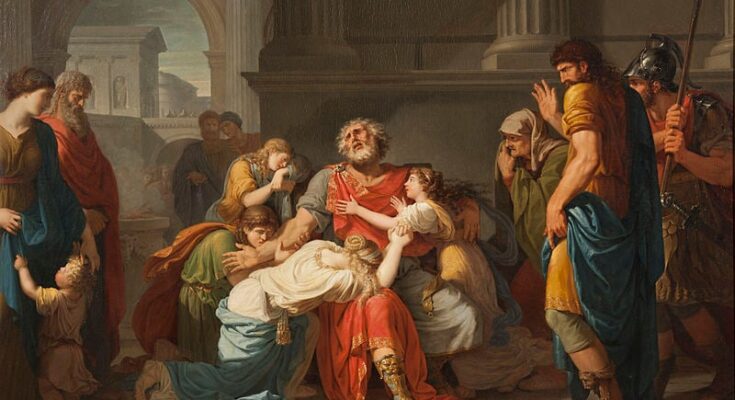The story of Oedipus is perhaps the most tragic story of ancient Greece. The mythological character was the king of Thebes and lived under the shadow of a curse that could not be avoided to the end of his days.
This shows that the ancient Greeks not only created glorious stories but also tragedies laden with pain and despair.
Oedipus was the son of Laius and Jocasta, the king and queen of Thebes. The misfortunes of his line were the result of a curse inflicted by his father.
When his son was born, Laius consulted an Oracle to find out his fate. To his horror, the oracle revealed that “he was condemned to die at the hands of his own son.”
The parents ordered a servant to kill their son, but the servant was unable to carry out this brutal act and therefore passed Laius on to a shepherd.
The shepherd called the boy Oedipus, or “swollen feet,” since Laius had tied his feet tightly. The child was taken to Corinth and given to King Polybus, who had no children and would raise him as his own son.
Futile effort to escape fate
When he was an adult, Oedipus heard a rumor that he was not the son of Polybus and his wife, Merope. Driven by doubt, he went to the oracle at Delphi and asked if the king and queen were really his parents, but instead of answering, the oracle told him that he had a dark destiny, “mating with his own mother and killing his own father.”
Desperate to avoid the oracle’s profession, Oedipus, who thought that Polybus and Merope were his true parents, left Corinth and headed for the city of Thebes.
On the way to Thebes, Oedipus met Laius, and the two argued over which chariot had the right of way. The Theban king moved to strike the insolent young man with his scepter, but Oedipus, unaware that Laius was his true father, threw the old man from his chariot and killed him.
Thus, Laius was killed by his own son, and half of the prophecy that the king had tried to evade by ordering the infant Oedipus’ death was fulfilled.

Before reaching Thebes, Oedipus met the Sphinx, a legendary beast with the head and breast of a woman, the body of a lioness, and the wings of an eagle.
The Sphinx was sent to the road that approaches Thebes as punishment from the gods and would strangle any traveler who could not solve a certain riddle; however, Oedipus did solve this riddle.
Oedipus’ reward for freeing Thebes from the sphinx was the hand of the dowager queen, Jocasta; no one realized then that Jocasta was the real mother of Oedipus.
Thus, unbeknown to any of the characters, the prophecy was finally fulfilled.
The unimaginable destiny of Oedipus
Oedipus, now king of Thebes, tried to solve the problems of a plague caused by the assassination of the previous king. The oracle warned that the only solution was to capture the King’s assassin of whom there was only one witness.
Jocasta, now the wife of Oedipus, sent for the witness to the murder of her deceased husband and former king.
Oedipus questioned him and he revealed that some years ago they gave him a child to abandon on Mount Citerón. The son of King Laius and Queen Jocasta had been handed over to die, preventing a fatal oracle from being fulfilled. However, he had turned him over to the shepherd out of mercy.
He discovered that he was that child who was destined to be the murderer of his father, and he cursed both himself and fate. When Jocasta entered the house, she ran to the palace bedroom and hanged herself there.
Oedipus, furious, ran through the house and discovered the body of Jocasta. He screamed when he saw her lifeless body and stabbed his own eyes with the needles that held his robe together.
The tragic story ends with Oedipus leaving the palace with bloodied eyes and asking to be banished as soon as possible. He says that he preferred to blind himself because he could not bear to look at his parents in hell, the children he had fathered, or the people of Thebes.



